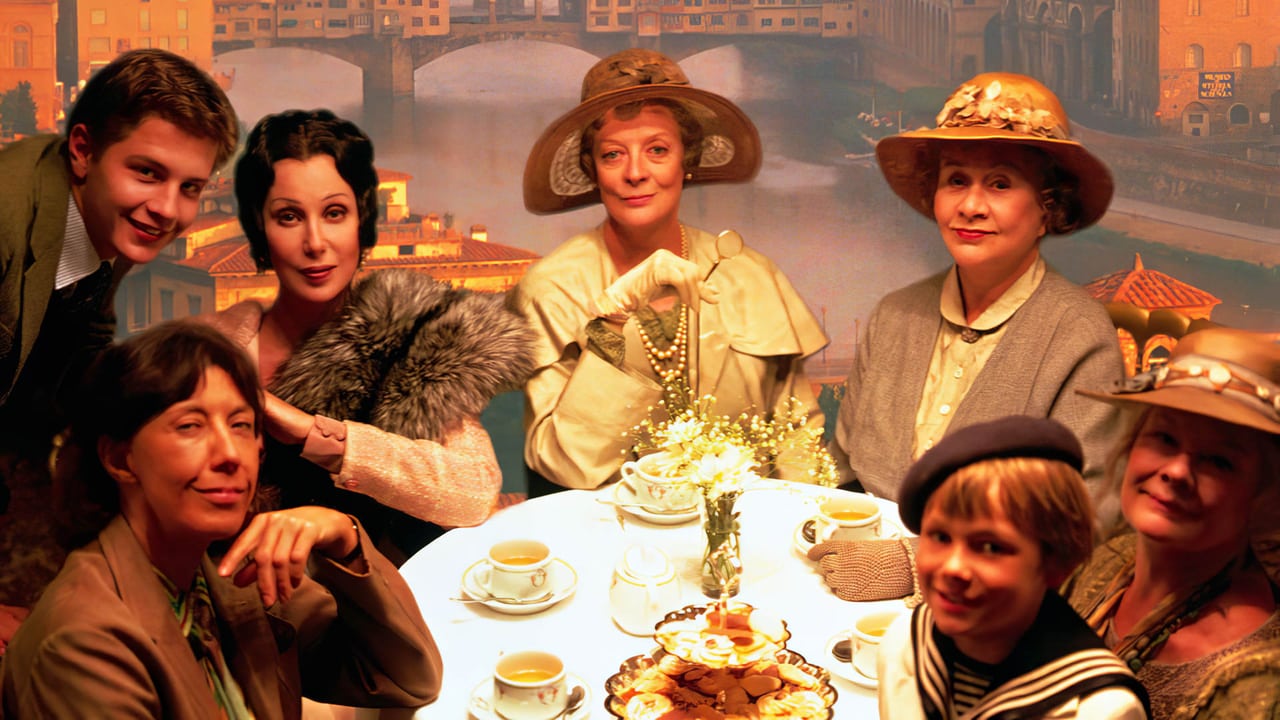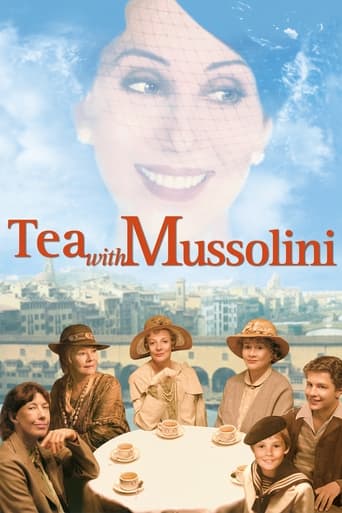

The Italian Anglophile Franco Zefferelli's endearing account of Englishness in 1930s/40s Italy is amongst his finest films. He co-wrote it with the English writer John Mortimer. It begins in Italy in 1935 at Elizabeth Barret Browning's grave - a symbol which bonds England and Italy. The English expatriates are represented by Judi Dench, Joan Plowright and a compelling Maggie Smith (winning the 1999 Bafta for Best Supporting Actress). Plowright is secretary to an Italian businessman who wants his young son Lucca to grow up to be a proper English gent - so Plowright teaches him Shakespeare and feeds him bacon and eggs. Then the rise of fascism means Lucca must be sent off to Austria. There follows a quite touching scene where the English ladies say goodbye by reciting the St Crispin Day's speech from Henry V at the railway station.The remainder of the drama follows the ladies' fortunes under the dictatorship of Mussolini. Smith's character, Lady Hester, is the widow of a former British ambassador, and does indeed take afternoon tea with Il Duce. The English ladies end up being in-turned but their Englishness remains defiant. During the Allied invasion of Italy, they are liberated by a Scottish regiment. Lady Hester declares: "The Germans and the Italians couldn't get rid of us, so there's no reason why we should surrender to the Scots."
... View MoreI was really disappointed with this film. The only reason I watched it was because of Dame Maggie Smith (who I adore) and Cher (because I was intrigued). I felt as though the director wanted to create a mass-murder using boredom. The plot is bizarre. Consider the grandson (or whatever the hell he was - he rarely spoke) of Dame Maggie's character. They dressed him as a girl so he would be imprisoned with the old ladies in the tower. It was slightly amusing at first, but he somehow manages to continue the deceit to the point that one of the guard's wanted to date him - despite his totally unconvincing appearance as a woman. If this was a comedy, that might be funny a la 'Some Like It Hot'. But this is supposed to be a drama? The kid (and later teenager) Luca was boring and clearly included in the story to make old ladies go 'awwwww'. I always cringe when I see the period piece British snob living abroad parading around like they are god while declaring the 'natives' are backwards. Just awful. The only bright spot was, astonishingly, Cher. The artistic and highly ostentatious character she played suited her - in fact you could believe it was Cher 1940's style. Dame Judy Dench looked weird. Lily Tomlin looked as though she stepped out of 'Raiders of the Lost Ark'. I found myself wanting something awful to happen to these old ladies, which is mean, but I couldn't help it. I actually laughed when the 'facists' threw their tea and paintings out the window (and I secretly wished that dog had gone as well - despite being a dog lover). The locations and scenery are beautiful though.
... View MoreI have rather mixed feelings about this one. The movie features beautiful Tuscan scenery, a background steeped in Florentine art treasures, appropriate period costumes, a dramatic wartime Italian setting, competent acting, and a sentimental personal story. However, for some reason it failed to live up to my expectations when I tuned in.The film depicts the semi biographical childhood tale of Italian director Franco Zeffirelli. Luca, the illegitimate son of a businessman disinterested in his offspring, is raised by his father's secretary and a group of British expatriot ladies living in pre fascist World War II Italy. These ladies enjoy idle days chit chatting, admiring the art of the old masters, and taking their four o'clock high tea at the Uffizzi, oblivious to the political and military storms brewing all around them. The women, all well past their prime, have come to genuinely love Luca, who progresses from a young boy to a teenager during the story. The Scorpionini, as these ladies come to be called for their biting tongues, prove to be quite naive, believing their safety to be guaranteed after tea is arranged with dictator Benito Mussolini. However, the British are eventually sent to Siena where they must live in close quarters and are more or less held as prisoners of war. These dames all have very disparate personalities, well portrayed by competent actresses. The group's leader is Lady Hester, Maggie Smith in her typical role as an insufferably snobbish English aristocrat. She constantly reminds the others that she is the wife of the former British ambassador to Italy, and she's the one who has in fact orchestrated the tea party with Il Duce hoping to ensure protection for these Britsh expatriots. Joan Plowright is Luca's chief guardian, Mary Wallace, the kind, grandmotherly secretary who has taken the young boy under her wing. Judi Dench portrays a free spirited artist (Arabella) and Lily Tomlin an American archaeologist (Georgie). As another noted, unnecessarily much is made of the fact that Georgie is a lesbian. For me, the star actress may actually be Cher, who plays a rich, independent, strong willed American Jewish widow named Elsa, who befriends these Britiah ladies while traveling about Europe seeking fine art and good times. Unfortunately this flamboyant character has a handsome but conniving Italian lover who ends up placing her in danger of execution.The women's bond with the orphaned Luca proves the most touching aspect of this tale. The movie does also depict how the genteel English ladies band with a pair of independent, modern American women to solve their wartime dilemmas. However, much of the time the dames are bickering and often seem just plain silly. I suppose that's intended as the point of the movie but a little of it went a long way, leaving me with something of a sense of disappointment in a story I had expected to love. It just wasn't quite the refreshing cup of tea I had anticipated.
... View MoreAnother masterpiece from Franco Zefferelli (also the man behind "Romeo and Juliet"), "Tea with Mussolini" portrays several English and American expatriate women raising an Italian boy in 1930's Florence. Always ready to reject authority, these women know how to live. It's another great tale of civil disobedience at a time when it seemed impossible if not dangerous. Cher, Judi Dench, Maggie Smith, Joan Plowright, and Lily Tomlin all do great jobs with the roles. It's weird to imagine Cher in such a role; I've always thought that she was kind of worthless. But even she does really well here. A splendid movie for all times. Definitely see it.
... View More